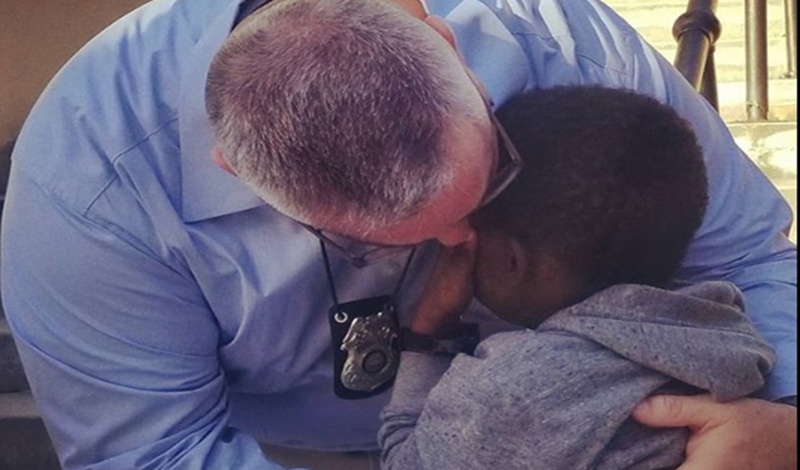
First responders race to myriad calls for service, meet an array of different people, and help manage unspeakable circumstances the day of the tragic incident and well beyond, helping victims/ surviving loved ones cope a bit better…circling back to ensure everything is mended as best possible.
Albeit without expectation, cops receive gratitude from those whose cross they foisted and helped carry.
I was recently minimizing some of my garage space when I came upon several boxes marked “Police Stuff.” I paused, then unsealed each cardboard carton.
In a lengthy Back to the Future kind of evening, I re-read each Thank You card and thoughtfully worded letter, many from citizens my squad and I aided directly. A bunch were from their family members with whom I became pseudo-adopted after a grim loss of their kin, in both natural deaths and mind-numbing tragedies.
First Responder Friendships
Throughout my entire police career, letters and Hallmarks were received from people I was positioned to help via the 911 phone lines, as a public safety telecommunicator whose voice answered the pleas for Help! After that, I physically showed up as a sworn policeman working the beat.
In law enforcement roles, situations reflecting the good, the bad, and the ugly become indelible. Sometimes people who experienced incidents in a bygone era resurface to rekindle with public safety professionals who helped them navigate tumultuous times.
A trooper assigned to the Kansas Highway Patrol (KHP) Troop C shares a bittersweet story about a father whose daughter and two grandbabies lost their lives in a motor vehicle crash (MVC) caused by a drunk driver. Tragically, this gentleman lost three loved ones…and gained a badged buddy who stood with him through grief and beyond.
Per KHP Trooper Ben:
On August 22, 2024, “I received a text from Joe, a father in Texas. Nearly eight years ago, in November 2016, I responded to a devastating crash near Junction City where a drunk driver crossed the median and struck Joe’s daughter, killing her and his two grandchildren.
“Since that tragic day, Joe and I have spoken a few times each year…just to talk about life and how things are going.
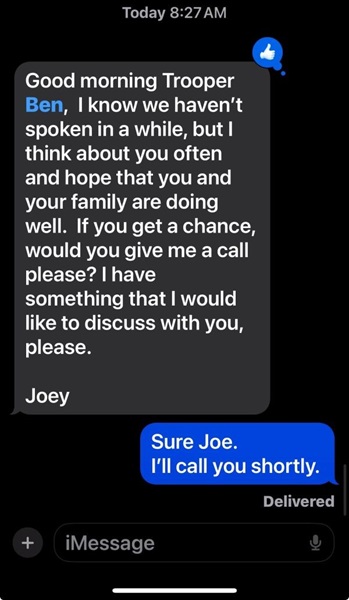
(Photo permission courtesy of Trooper Ben, Kansas Highway Patrol.)
“As first responders, we step into difficult situations with the intent to help in that moment. But our role doesn’t end when we leave the scene. The impact we have on the people we meet often continues over days, weeks, months, and even years. We’re there not just for that one day, but for the days that follow—helping them move forward after the unimaginable.
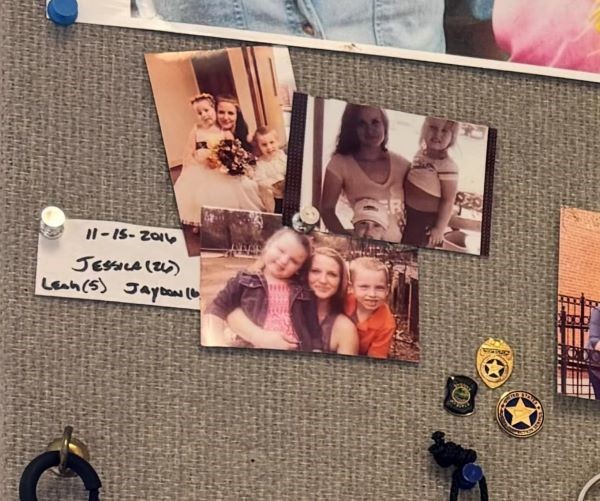
(Photo courtesy of Trooper Ben, Kansas Highway Patrol.)
“Service isn’t just about being there once; it’s about being there for the long haul.
“Please, always remember to drive sober. The choices you make on the road can have lasting effects on lives, far beyond what you might ever realize.”
Testimonies in Time
Given all the guff LEOs receive, especially recently, testimonies from citizens pillared by cops during hugely distressing times are a welcome salve for the beleaguered badges otherwise known as God’s peacekeepers.
Trooper Ben’s social media page is populated with several recounts exemplifying today’s topic.
One said, “Thank you for your service and support. I lost my husband in a fatal accident in October 2017. To this day, I carry the card of the officer who had to deliver the devastating news to me. I’ll never forget how he approached me in my fragile state. It’s a job I could never handle.”
Another offered, “You made a huge impact on Joey and Jessica’s mother. Thank you for your compassion that day ensuring Joey could get to Wichita to Jayden quickly. God be with you and the weight you bear in these tragedies.”
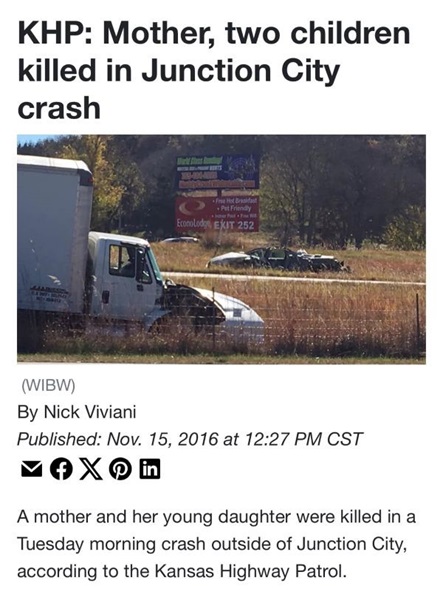
(Photo courtesy of Trooper Ben, Kansas Highway Patrol.)
That was followed by this comment: “My mom was killed by a drunk/high driver. The grief can be unbearable some days! Thank you to all first responders and all you do! You truly are compassionate and caring people! Keep safe and thank you for your service and support!”
Bonds from Bittersweet Beginnings
Given the litany of citizens with whom cops have contact daily, good friendships from bad situations are one of the bittersweet aspects of being a law enforcement officer aiding people during horrific life episodes.
Sometimes nature takes its course: folks pass on and police personnel have a role in recording the death, dispelling suspicions when the decedent was found unattended (versus hospice facilities providing palliative care until the final breath).
I once responded to a “Dead Person” call made by family members who went to visit their elderly loved one and found him peacefully reposed in bed, deceased. There were no known health issues; he was in his 80s and passed away in his sleep.
It was early in my police career. I was just “cut loose” from our department’s months-long field training program. I was assigned the call. Eight family members were already there. I investigated, with sensitivity to the circumstance, discreetly processing the situation.
Sobs were in the background. Spiritual icons —crosses, rosaries, Mother Mary statues, praying hands paintings— adorned the bedroom of this now-deceased military veteran. His home was immaculate.
His daughter approached me and shook my hand. Then her husband did the same. A few other family members there followed suit. Sorrowfully, I reiterated my heartfelt condolences, explained the next formal steps, and excused myself. I sat curbside in front of the home, typing the Information report on my in-car laptop.
A few times, a family member came outside to ask me questions about cemeteries and their deceased loved one’s transportation from the home (those formal steps mentioned above). I explained how funeral home personnel would arrive, take due care, and walk them through subsequent intervals.
I returned to the house the next duty day and checked on the family (who were going through important documents). I answered a few more questions, rendered my condolences again, and clarified that they had my phone number to call and chat about anything on their minds. (My grandparents all perished when I was a young boy: three from cancer and one in a fiery car crash. I wished to be a pillar for anyone who felt devastated.)
Weeks after that, the police chief received a letter from the decedent’s family, extending kind words for my “professional and caring demeanor during such a sensitive, somber family experience.” Every year after that, I received a Christmas card from that family, mailed to the police station. Those keepsakes were in the “Police stuff” box I found in the garage.
As I compose these words, another law enforcement officer in nearby New Port Richey, Florida, recently found himself in the same duty boots I just described…
As told by his squad supervisor:
“Earlier this month, Officers Peal and Milne were dispatched to a call for service. A resident at the call location had lost his wife of over 30 years to an apparent natural death.
“While on-scene with Officers Milne and Peal for a short time before having to leave to handle other calls for service, Sergeant Williams observed that both officers handled the investigation with professionalism and compassion for the grieving husband.
“A few days later, Officer Peal returned to the residence independently to check on the husband’s welfare. Unable to contact him, he returned multiple times throughout the day until he was able to verify the resident’s well-being since his wife’s passing and see if there was anything Officer Peal could do for him.
“Sgt. Williams was informed that Officer Peal had left a note outside the resident’s door for the husband to contact him. Sgt. Williams went to the residence to check and found the note attached to a meal Officer Peal had purchased and delivered to him.
“Officer Peal’s act of kindness is an example of the professionalism and dedication to service he demonstrates to the citizens he serves.”
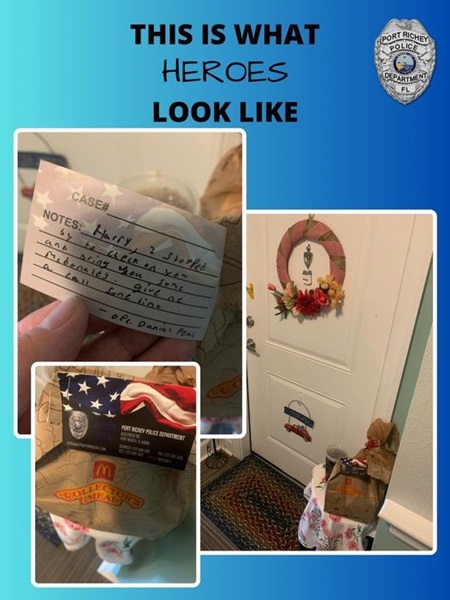
(Photo courtesy of the New Port Richey Police Department.)
These are a mere few of the many instances of America’s cops exuding compassion and care for folks bearing the weight of the world, ensuring that citizens know they have a peacekeeper in the wing who is ready to help shoulder life’s weighty circumstances, that they are not alone in the mix of emotions caused by hardships.
It is not only about worst-case scenarios whereby cops show up and lend a hand.
Many calls for service are rather innocuous, such as checking on residences of folks who registered with police departments, informing them that they will be away, on vacation, and that no one should be at their respective homes.
When the police radio was calm enough, our department’s officers checked the homes listed on our agency’s Vacation Watch program, leaving police business cards (incident number written on the reverse, along with the date/time a cop was there), which homeowners would find upon their return.
Many of the Thank You! letters I referred to above (boxes of “Police Stuff” in the garage) stemmed from this service.
First responders are consistent responders, forming lasting impressions resulting in righteous relationships. When asked about that proverbial Why? we became cops, the examples explained herein are unambiguous responses…with lifelong attributes.
Since we are near the bottom of this article, let’s explain the image up top…
The cover photo portrays a Tampa Police officer hugging a young boy. Fox News covered the story back in January 2019:
“The Tampa Police Department posted this bittersweet moment to social media, [depicting] Corporal Jim Verble hugging his emotional ‘little brother’ who doesn’t want Verble to retire. Cpl. Verble, who supervised school security officers, mentored the Seminole Heights Elementary student as part of the Bigs in Blue mentoring program.”
Heartrending, but…
“Don’t worry, little guy, although Corporal Verble is retired now he will still be your Big Brother,” a Tampa Police spokesperson echoed.
After 25 years of police service, Detective Verble retired but maintained his bond with the young boy, making a lasting impression on the child who got to know and admire him, like so many others who harbor hope via the kinship of first responders.
As Trooper Ben stated: “…it’s about being there for the long haul.”